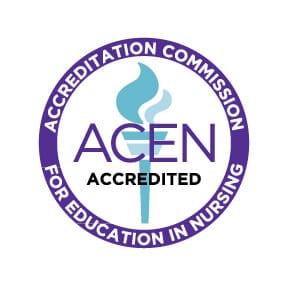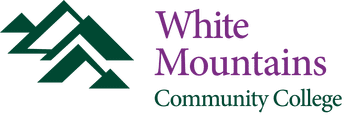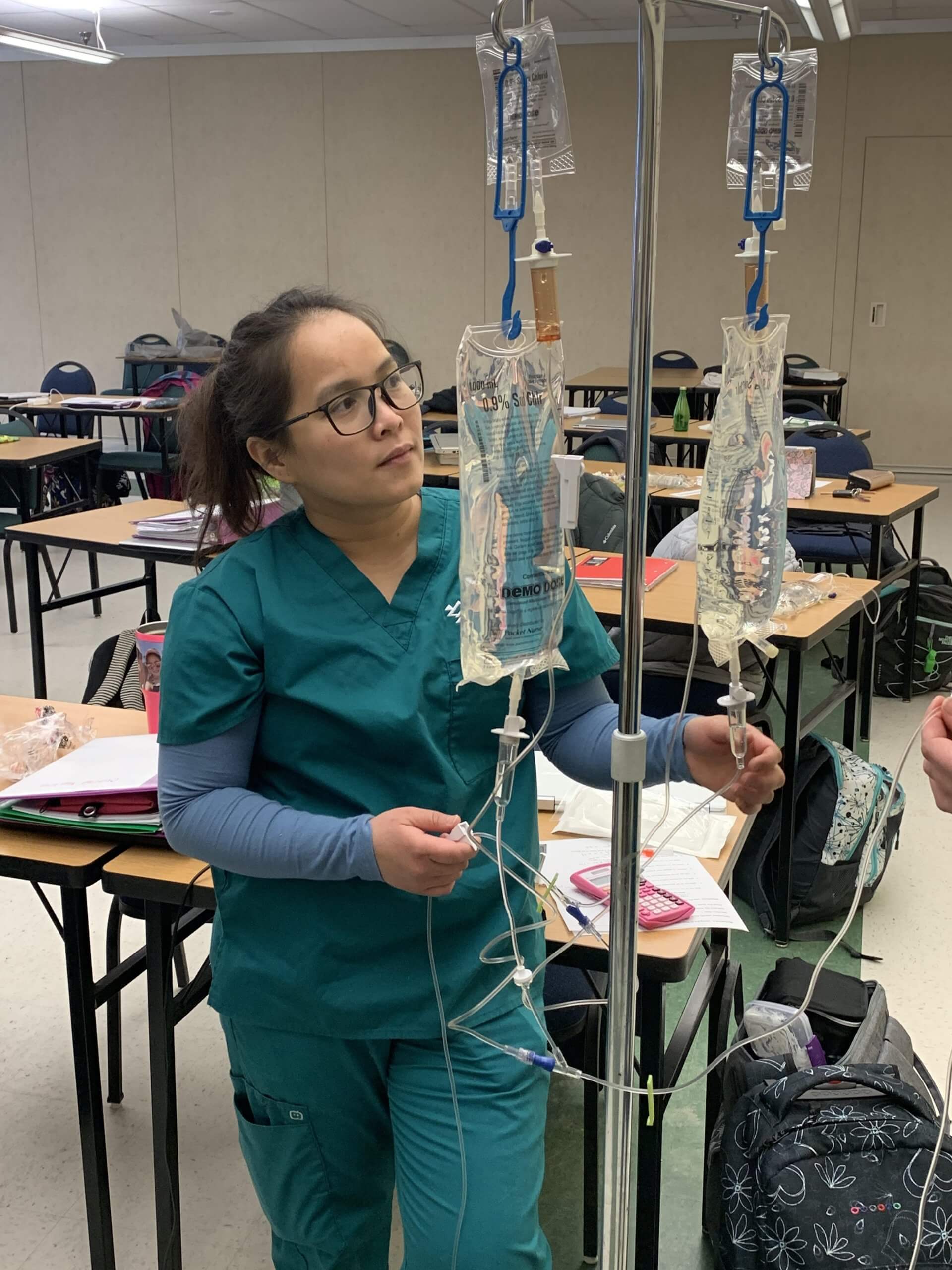Overview
“When you’re a nurse, you know that everyday you touch a life or a life will touch yours.” WMCC is proud to provide an ACEN accredited, high-quality, comprehensive, student-centered nursing education. During the two-year Registered Nurse program, our expert faculty will prepare you on campus through classroom lectures and our state-of-the-art simulation lab. Off campus clinical rotation experiences also occur throughout the program at local hospitals, nursing homes, and other social service agencies throughout northern New Hampshire.
Program Purpose
The nursing program prepares students to provide safe, comprehensive nursing care to diverse individuals, families, groups, and communities in acute, long-term, ambulatory, mental health, and other structured settings. The program consists of nursing, science and general education courses. Nursing courses include classroom, simulation lab and clinical experiences. Learning experiences and clinical practical may vary in time and locations.
The program may be completed on a full-time or part-time basis. Classroom and clinical components of the nursing program must be completed concurrently. All nursing courses must be completed within three years from the date of entry into the first nursing course.
Students admitted into the nursing program must take nursing courses in sequence, and must achieve a minimum grade of C+ (76.67) in all major theory and science courses (Nursing, A&P I/II, and Microbiology), and a C (73.33) in all other general education program requirements, as well as achieve a grade of “Pass” in clinical to continue in the program.
Admission Requirements
- Meet college requirements for admission. Submit official high school and previous college transcripts to the WMCC Admissions Department.
- Achieve a minimum total score of 60.0% or better on the ATI Test of Essential Academic Skills (ATI TEAS). Applicants are allowed three (3) attempts and the test scores are valid for a period of three (3) years. Contact the WMCC admissions office for exam dates and cost. TEAS handout for testing at WMCC.
- Have completed science courses within five (5) years of their first Nursing course at WMCC to be eligible for transfer credit. Transfer credits are awarded for Anatomy & Physiology I and II and Microbiology only if the grade is a C+ or better.
- Submit two professional references, work or education
Applications are not complete until all the above-mentioned documents have been received. To qualify for admission, applications must be completed by March 15th.
Selection Criteria
Selection is determined by the Nursing Admission Rubric, which evaluates applicable college courses and grades, the ATI TEAS score, and references. Qualified students who are not accepted at first may be assigned to a prioritized waiting list based on the above criteria. They may be subsequently admitted if an opening becomes available prior to the beginning of the fall semester. Students desiring admission in the future must reapply.
Upon Acceptance
All students accepted into the Nursing program will:
- Submit a current physical examination (within 1 year prior to beginning their first Nursing course), including all immunizations/titers.
- Possess and maintain personal health insurance.
- Acquire and maintain current Basic Life Support-Healthcare Provider certification.
- Complete a criminal background check through the program’s approved vendor.
- Complete a drug screening through the program’s approved vendor.
The clinical portion of the degree program is offered at area health care facilities (“clinical sites”). Clinical sites establish their own requirements for persons entering their facilities for educational purposes. Clinical sites may have established vaccination requirements, including vaccination for COVID-19. As with all clinical program requirements, the clinical site reserves the right to deny participation to any student who does not meet required clinical criteria and do not follow clinical site policies. Individual programs of study do not have the authority to secure clinical experience(s) for students who do not meet eligibility criteria. Students participating in clinicals must adhere to the sites’ requirements. While these are not college requirements, failure to adhere to the clinical site requirements will result in ineligibility to complete the Nursing program. Students may request exemptions through the appropriate college or clinical coordination representative, who will forward the request to the clinical site for consideration. Until an exemption or approval for attendance is granted by the clinical site, students will not be able to attend their assigned clinicals. Inability to attend clinical could impact clinical attendance, continuation in the program, and financial aid. Students should contact Sarah Baillargeon MSN, RN, WMCC Nursing Program Coordinator to find out a clinical site’s vaccine requirements and the process for seeking exemption.
LPN to RN Completion Option
Licensed Practical Nurses wishing to advance their education and complete their Associate in Science degree in Nursing may transfer into the second semester of the nursing program pending seat availability after meeting the following criteria:
- Have successfully completed a practical Nursing program from an accredited school or
- Provide evidence of a current unencumbered LPN license.
- Meet all college requirements.
- Provide evidence of first semester courses:
- Human Growth and Development with a C or better.
- Anatomy and Physiology I with a C+ or better and completed within the last 5 years.
- Science courses completed within 5 years of students’ admission into the Nursing program. Transfer credits are awarded for grades of C+ or better for Anatomy and Physiology I and II and Microbiology.
- Achieve a 77% or better on a drug calculations test.
- Take ATI Practical Nurse Comprehensive Predictor and achieve 68% or better.
- Demonstrate competency in specified skills including assessment of vital signs, medication administration, and sterile technique.
A meeting with the Nursing Program Coordinator is recommended to ensure the student is prepared for entry into the second semester of the first year.
Transfer Policy
Transfer into the nursing program may be an option only if there is space available. Transfer requests are evaluated individually based on the student’s qualifications and seat availability. Contact the Nursing Program Coordinator for further information.
Readmission Policy
Students matriculated in the associate degree in Nursing who withdraw or do not achieve the required minimum grade may be eligible for readmission. Readmission requests are evaluated on a case-by-case basis, they must occur within one year of the student’s exiting the program, and they are contingent upon space availability. The student applying for readmission is required to meet the curriculum requirement in effect at the time of readmission.
Students who have failed a Nursing course because of unsafe practice involving actions or non-actions are NOT eligible for readmission into the Nursing program.
Employment/Transfer Opportunities
Upon successful completion of the degree, graduates are eligible to sit for the National Council Licensing Examination for Registered Nurses (NCLEX-RN). Prior to meeting all course requirements for the degree, students may be eligible to apply to the New Hampshire Board of Nursing for additional licensure after the successful completion of Nursing I (LNA) and Nursing III (LPN). The New Hampshire State Board of Nursing may restrict licensing of candidates who have been involved in civil or criminal legal action. Questions about licensing restriction should be addressed to:
Office of Professional Licensure and Certification
Division of Health Professions
Board of Nursing
7 Eagle Square
Concord, NH 03301
(603) 271-2323 (Nursing)
(603) 271-6382 (Nursing Assistant)
(603) 271-6605 (Fax)
The Nursing program maintains articulation agreements with colleges and universities throughout New England. Further information can be obtained from the Nursing Program Coordinator.
The Associate in Science degree in Nursing at WMCC meets the state education requirements for a Registered Nurse license in the state of New Hampshire. WMCC has not determined if its degree in Nursing meets the state education requirements for any other state, any U.S. Territory, or the District of Columbia. Contact the state regulatory agency for nursing requirements in any other state for which this information is needed.
The Associate in Science degree in Nursing is approved by the New Hampshire Board of Nursing (NHBON). Upon satisfactory completion of the degree, graduates are eligible to apply to the New Hampshire Board of Nursing (NHBON) and Pearson VUE NCLEX Candidate Services for the National Council Licensing Examination for Registered Nurses (NCLEX-RN). The New Hampshire Board of Nursing’s licensing regulations may restrict candidates who have been involved in civil or criminal legal proceedings. Questions about licensing restrictions should be addressed to:
Office of Professional Licensure and Certification
Division of Health Professions
Board of Nursing
7 Eagle Square
Concord, NH 03301 [email protected]
www.oplc.nh.gov/new-hampshire-board-nursing
The Nursing program at WMCC located in Berlin, NH, is accredited by:
Accreditation Commission for Education in Nursing (ACEN)
3390 Peachtree Rd. NE, Suite 1400
Atlanta, GA 30326
(404) 975-5000
www.acenursing.org
The most recent accreditation decision made by the ACEN Board of Commissioners for the Nursing program at WMCC is Initial Accreditation. Information regarding this accreditation appears in ACEN’s public disclosure.

First Year
| Fall Semester | Lec | Lab | Cr | |
| BIOL114W | Human Anatomy and Physiology I | 3 | 2 | 4 |
| NURS110W | Nursing Success Seminar | 1 | 0 | 1 |
| NURS111W | Nursing I | 4 | 12 | 8 |
| PSYC112W | Human Growth & Development | 3 | 0 | 3 |
| Semester Total | 11 | 14 | 16 | |
| Spring Semester | Lec | Lab | Cr | |
| BIO115W | Human Anatomy & Physiology II | 3 | 2 | 4 |
| ENGL120W | College Composition | 4 | 0 | 4 |
| NUR112W | Nursing II | 5 | 12 | 9 |
| Semester Total | 12 | 14 | 17 | |
| Total for Year | 33 | |||
Second Year
| Fall Semester | Lec | Lab | Cr | |
| BIOL211W | Microbiology | 3 | 2 | 4 |
| NURS210W | Nursing III | 5 | 15 | 10 |
| PSYC111W | Psychology | 3 | 0 | 3 |
| Semester Total | 11 | 17 | 17 | |
| Spring Semester | Lec | Lab | Cr | |
| HUMA212W | Legal and Ethical Issues | 3 | 0 | 3 |
| NURS214W | Nursing IV | 4 | 15 | 9 |
| English Elective | 3 | 0 | 3 | |
| Mathematics (Statistics recommended) | 4 | 0 | 4 | |
| Semester Total | 14 | 15 | 19 | |
| Total for Year | 36 | |||
| Total for A.S. Degree | 69 | |||
Program Outcomes
Upon successful completion of this degree, graduate are able to:
- Demonstrate well-planned, safe and effective, culturally appropriate, patient-centered care using the nursing process.
- Utilize the principles of communication, engagement, caring, presence, accountability, and service within a legal and ethical framework.
- Practice collaboratively within nursing and with multi-professional health care providers.
- Incorporate best current, evidence-based practice in planning and implementing care for optimal health and wellness.
- Utilize healthcare systems resources to plan, organize and deliver care.
- Interact effectively with patients, families, and colleagues using therapeutic communication.
- Demonstrate accountability and professionalism in the nursing role using legal, ethical, regulatory, and humanistic principles.
- Participate in leadership and spirit of inquiry that contribute to lifelong learning, professional growth, and the body of nursing knowledge.
Student Achievement of Program Outcomes (Aggregated Data)
Performance on Licensure Exam: NCLEX-RN Pass Rates (first time test takers)
| Class of 2020 | Class of 2021 | Class of 2022 | Class of 2023 | |
| WMCC Pass Rate | 96.67% | 89.47% | 80% | 100% |
| NH Pass Rate | 96.2% | 93.35% | 89.70% | 96.08% |
| National Pass Rate | 86.57% | 82.48% | 79.9% | 88.55% |
*As published by NCSBN 12/31/2023
https://www.ncsbn.org/public-files/NCLEX_Stats_2023_Q4_PassRates.pdf
Program completion rates (within 100% of program stated length)
| Time Frame (Fall-Spring) | Completion Rates |
| 2022-2024 | 76.67% |
| 2021-2023 | 70% |
| 2020-2022 | 64.1% |
| 2019-2021 | 58.06% |
Dr. Stephanie Norton
Health Sciences and ServicesProfessor of Nursing
- All students in the WMCC Nursing program must be able to perform diverse, complex, and specific functions and skills. Technical and professional standards for nursing are essential, standards that speak to a student’s ability to participate and succeed in the Nursing program. WMCC must ensure that patient safety is not compromised by students during their learning experiences. Therefore, students are expected to demonstrate emotional stability, exercise sound judgment, accept directions and guidance from supervisors or faculty members, and establish rapport and appropriate interpersonal relationships with peers, staff, patients, and their families.
- The following technical standards provide guidance to students regarding the skills and abilities necessary for them to function successfully in the program and ultimately in the nursing profession. Applicants who think they may not be able to meet one or more of the technical standards must contact the Nursing Program Coordinator to discuss individual cases.
- Adequate strength and motor coordination to perform the following physical activities: operating and handling equipment, moving, and transferring patients, performing CPR.
- Adequate hearing to assess patient needs and to understand instructions, emergency signals, and telephone conversations.
- Adequate visual acuity to observe patients, manipulate equipment, and interpret data; visual acuity sufficient to ensure a safe environment, identify color changes, and read fine print/writing and calibrations.
- Adequate speech and language ability to express, comprehend, and exchange information and ideas verbally and non-verbally. Adequate speech and language ability to interact clearly and logically with patients, family members, physicians, peers, and other medical personnel.
- Ability to work with frequent interruptions, to respond appropriately in emergencies or unexpected situations, and to cope with variations in workload and stress levels.
- Ability to maintain mature, effective relationships with patients, students, faculty, staff, and other professionals under all circumstances.
- to understand instructions, emergency signals and telephone conversations.
- Adequate visual acuity to observe patients, manipulate equipment and interpret data; visual acuity sufficient to ensure a safe environment, identify color changes, read fine print/writing and calibrations.
69 Credits Required
of students qualify for financial aid





